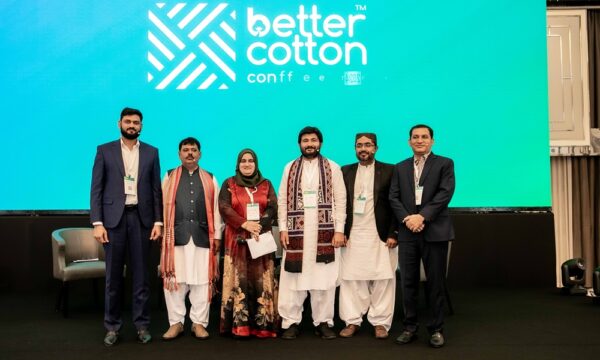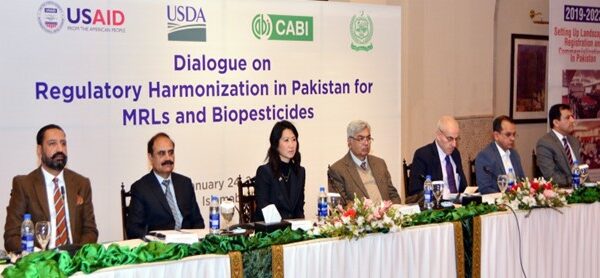
CABI in Pakistan took the opportunity to showcase its work on cotton, as part of a special World Cotton Day event hosted by the Central Cotton Research Institute (CCRI) in Multan, which included details on how it supporting more than 32,000 cotton farmers, 52,000 cotton farm workers and 500 agriculture extension workers through its projects.
Cotton production in Pakistan is integral to the economic development of the country and is the fourth largest producer of the crop in the world after China, India and the USA. The country is largely dependent on the cotton industry and its related textile sector, and the crop has been given a principal status in the country where in 2017 cotton exports were worth more than US $3billion.
World Cotton Day was an opportunity for the CCRI to show the positive impact cotton will continue to have in the future and convince the international community to join the celebration and appreciate the advantages of cotton – ranging from its qualities as a natural fiber to the benefits people obtain from its production, transformation, trade and consumption.
It also provided the chance to highlight the challenges faced by the world’s cotton economies, as cotton is significant for the least developed, developing and developed economies worldwide. This includes the management of cotton pests and diseases such as cotton leaf curl disease, cotton blue disease and cotton boll weevil.
CABI participated in the event by establishing a pavilion and displayed three cotton projects; the Better Cotton Initiative (BCI), the Cotton Advocacy for Policy and Seed (CAPAS) project and the Natural Enemy Field Reservoir (NEFR). The CABI pavilion consisted of live specimens, key performance indicators (banners), awareness raising material on pest and natural enemies, modules on NEFR and an LED display to show project videos.
The CABI pavilion was visited by Representatives of WWF Pakistan, Representative of Lok Sanjh Foundation, Reeds Pakistan, Mr Zahid Mehmood (Director, CCRI), Dr Shafique (RD, BCI) and Mr Saqib Ali Ateel (Secretary, Agriculture South Punjab) and Mr Hassan Raza CEO, Neelum Seeds Company.
Mr Saqib Ali Ateel also highlighted the importance of cotton – sharing expertise and views for the sustainability of cotton production and strategies to deal with the current issues of the crop.
The men were also briefed that CABI is engaged in the development of the country’s first ‘national organic cotton policy.’ For this purpose, CABI is engaging all provincial and federal stakeholders for the drafting of this policy.
CABI experts also highlighted that climate change and changing consumer preferences – at national and international level – are pushing hard the demand for organic cotton and textile brands are taking great interest in the sustainable production of organic cotton in Pakistan.
Additional information
Main image: The CABI pavilion manned by staff including Mr Riaz Mahmood – Senior Biological Control Specialist at CABI’s Centre for Central and West Asia (CWA) based in Rawalpindi who develop the Natural Enemies Field Reservoir (NEFR) concept for the management of pests on farms.
Blog authors:
Babar Baloch, Project Manager-CAPAS Project
Noreen Mangrio, Gender cum Comms. Expert, BCI Project
CABI operates in Pakistan as bonafide research institute in association with Pakistan Agricultural Research Council.
CABI is an intergovernmental organization with UN Treaty.


Related News & Blogs
Empowering farmers through digitalisation: Strengthening the future of the cotton industry
When it comes to farmer advisory, are we really able to advise? That was the question posed to Katherine Cameron, CABI’s Head of Digital Advisory Tools, at the Better Cotton Conference 2025 which took place recently in Izmir, Turkey. The responsibility…
24 June 2025




